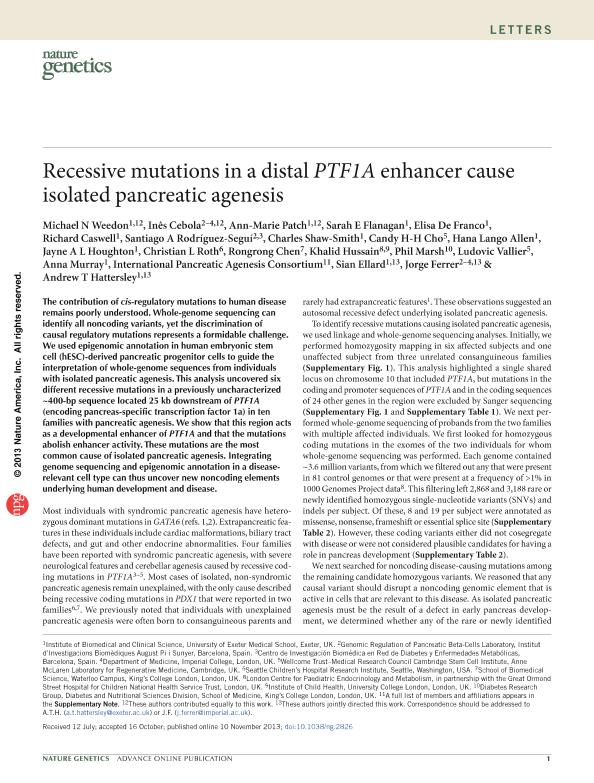Mostrar el registro sencillo del ítem
dc.contributor.author
Weedon, M. N.
dc.contributor.author
Cebola, I.
dc.contributor.author
Patch, A. M.
dc.contributor.author
Flanagan, S.
dc.contributor.author
De Franco, E.
dc.contributor.author
Caswell, R.
dc.contributor.author
Rodríguez Seguí, Santiago Andrés

dc.contributor.author
Shaw Smith, C.
dc.contributor.author
Cho, C.
dc.contributor.author
Allen, H. L.
dc.contributor.author
Houghton, J.
dc.contributor.author
Roth, C. L.
dc.contributor.author
Chen, R.
dc.contributor.author
Hussain, K.
dc.contributor.author
Marsh, P.
dc.contributor.author
Vallier, L.
dc.contributor.author
Murray, A.
dc.contributor.author
International Pancreatic Agenesis Consortium
dc.contributor.author
Ellard, S.
dc.contributor.author
Ferrer, J.
dc.contributor.author
Hattersley, A. T.
dc.date.available
2019-10-16T19:55:37Z
dc.date.issued
2014-01
dc.identifier.citation
Weedon, M. N.; Cebola, I.; Patch, A. M.; Flanagan, S.; De Franco, E.; et al.; Recessive mutations in a distal PTF1A enhancer cause isolated pancreatic agenesis; Nature Publishing Group; Nature Genetics; 46; 1; 1-2014; 61-64
dc.identifier.issn
1061-4036
dc.identifier.uri
http://hdl.handle.net/11336/86053
dc.description.abstract
The contribution of cis-regulatory mutations to human disease remains poorly understood. Whole-genome sequencing can identify all noncoding variants, yet the discrimination of causal regulatory mutations represents a formidable challenge. We used epigenomic annotation in human embryonic stem cell (hESC)-derived pancreatic progenitor cells to guide the interpretation of whole-genome sequences from individuals with isolated pancreatic agenesis. This analysis uncovered six different recessive mutations in a previously uncharacterized ∼400-bp sequence located 25 kb downstream of PTF1A (encoding pancreas-specific transcription factor 1a) in ten families with pancreatic agenesis. We show that this region acts as a developmental enhancer of PTF1A and that the mutations abolish enhancer activity. These mutations are the most common cause of isolated pancreatic agenesis. Integrating genome sequencing and epigenomic annotation in a disease-relevant cell type can thus uncover new noncoding elements underlying human development and disease.
dc.format
application/pdf
dc.language.iso
eng
dc.publisher
Nature Publishing Group

dc.rights
info:eu-repo/semantics/openAccess
dc.rights.uri
https://creativecommons.org/licenses/by-nc-sa/2.5/ar/
dc.subject
PANCREAS
dc.subject
AGENESIS
dc.subject
PTF1A
dc.subject
ENHANCER
dc.subject.classification
Genética Humana

dc.subject.classification
Medicina Básica

dc.subject.classification
CIENCIAS MÉDICAS Y DE LA SALUD

dc.title
Recessive mutations in a distal PTF1A enhancer cause isolated pancreatic agenesis
dc.type
info:eu-repo/semantics/article
dc.type
info:ar-repo/semantics/artículo
dc.type
info:eu-repo/semantics/publishedVersion
dc.date.updated
2019-09-30T18:52:07Z
dc.journal.volume
46
dc.journal.number
1
dc.journal.pagination
61-64
dc.journal.pais
Reino Unido

dc.journal.ciudad
Londres
dc.description.fil
Fil: Weedon, M. N.. University of Exeter; Reino Unido
dc.description.fil
Fil: Cebola, I.. Institut d’Investigacions Biomèdiques August Pi i Sunyer; España. Centro de Investigación Biomédica en Red de Diabetes y Enfermedades Metabólicas; España. Imperial College London; Reino Unido
dc.description.fil
Fil: Patch, A. M.. University of Exeter; Reino Unido
dc.description.fil
Fil: Flanagan, S.. University of Exeter; Reino Unido
dc.description.fil
Fil: De Franco, E.. University of Exeter; Reino Unido
dc.description.fil
Fil: Caswell, R.. University of Exeter; Reino Unido
dc.description.fil
Fil: Rodríguez Seguí, Santiago Andrés. Institut d’Investigacions Biomèdiques August Pi i Sunyer; España. Centro de Investigación Biomédica en Red de Diabetes y Enfermedades Metabólicas; España. Consejo Nacional de Investigaciones Científicas y Técnicas; Argentina
dc.description.fil
Fil: Shaw Smith, C.. University of Exeter; Reino Unido
dc.description.fil
Fil: Cho, C.. Anne McLaren Laboratory for Regenerative Medicine; Reino Unido
dc.description.fil
Fil: Allen, H. L.. University of Exeter; Reino Unido
dc.description.fil
Fil: Houghton, J.. University of Exeter; Reino Unido
dc.description.fil
Fil: Roth, C. L.. Seattle Children’s Hospital Research Institute; Estados Unidos
dc.description.fil
Fil: Chen, R.. King’s College London; Reino Unido
dc.description.fil
Fil: Hussain, K.. University College London; Reino Unido
dc.description.fil
Fil: Marsh, P.. King’s College London; Reino Unido
dc.description.fil
Fil: Vallier, L.. Anne McLaren Laboratory for Regenerative Medicine; Reino Unido
dc.description.fil
Fil: Murray, A.. University of Exeter; Reino Unido
dc.description.fil
Fil: International Pancreatic Agenesis Consortium. No especifica;
dc.description.fil
Fil: Ellard, S.. University of Exeter; Reino Unido
dc.description.fil
Fil: Ferrer, J.. Institut d’Investigacions Biomèdiques August Pi i Sunyer; España. Centro de Investigación Biomédica en Red de Diabetes y Enfermedades Metabólicas; España. Imperial College London; Reino Unido
dc.description.fil
Fil: Hattersley, A. T.. University of Exeter; Reino Unido
dc.journal.title
Nature Genetics

dc.relation.alternativeid
info:eu-repo/semantics/altIdentifier/doi/http://dx.doi.org/10.1038/ng.2826
dc.relation.alternativeid
info:eu-repo/semantics/altIdentifier/url/https://www.nature.com/articles/ng.2826
Archivos asociados
